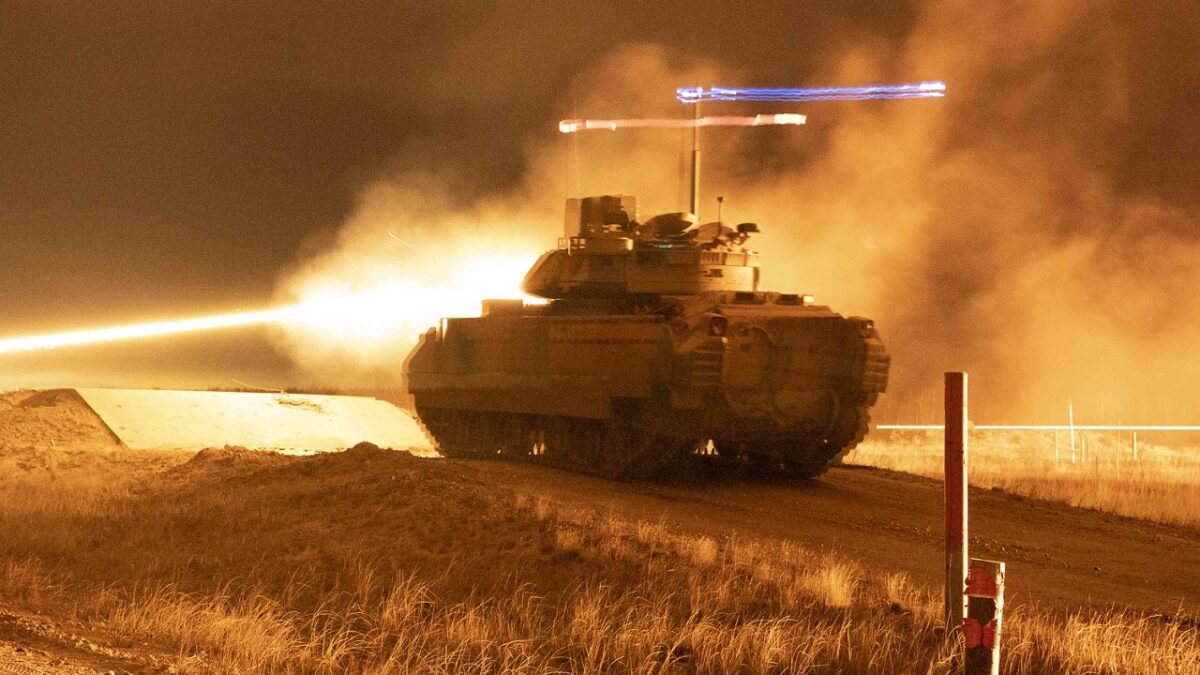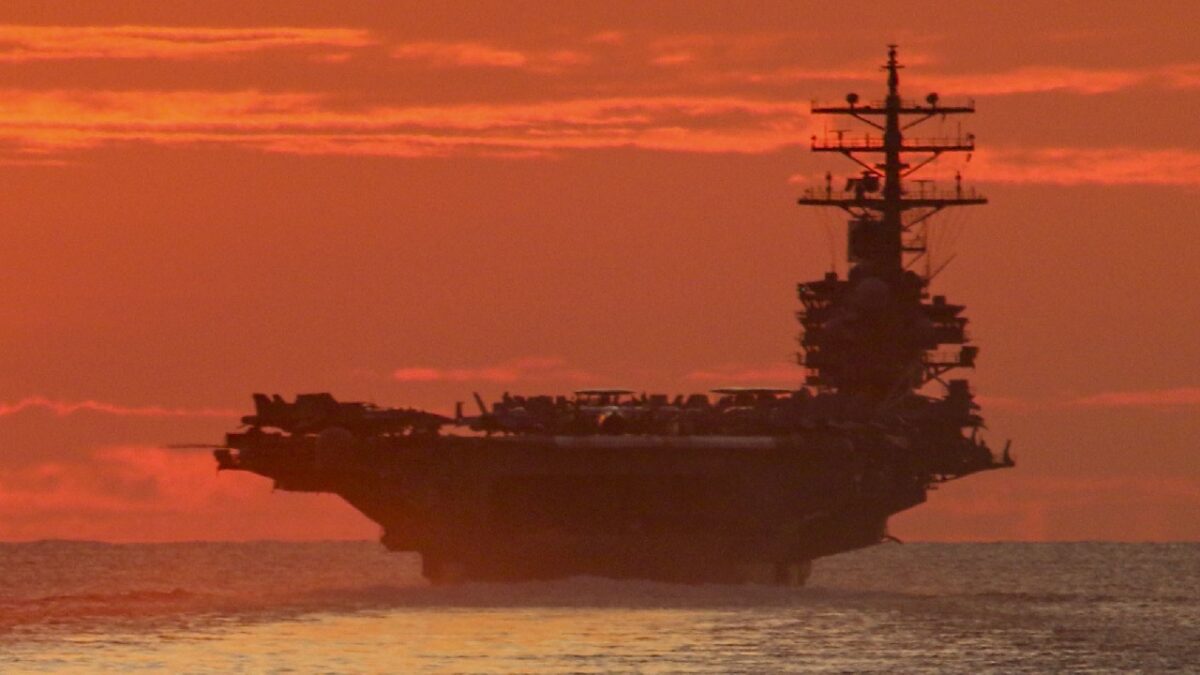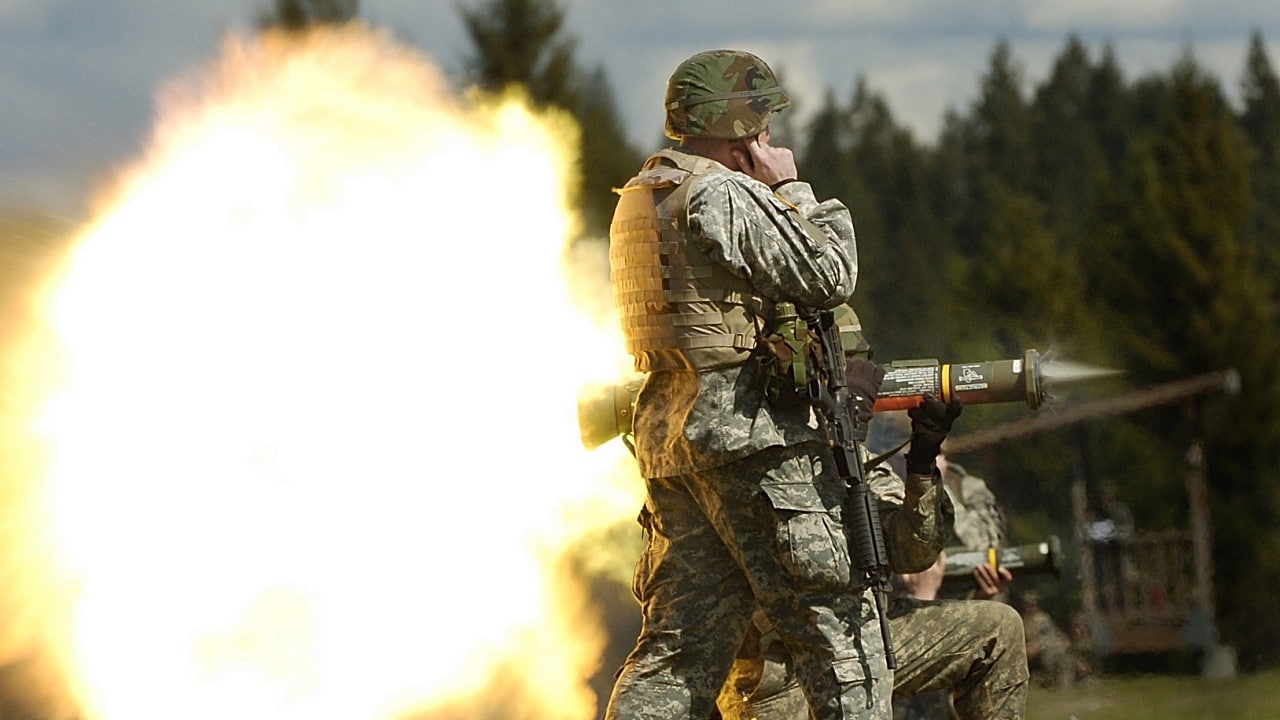Ever since Vladimir Putin launched his invasion of Ukraine and the Biden administration galvanized a NATO-wide effort to supply Kyiv with weapons and aid, U.S. policy has witnessed a deepening rift.
On one side are those — this author included — who see our response as a reaffirmation of America’s strategic DNA. On the other side of the rift stand those who maintain that the European theater is a distraction from the primary threat the United States faces, which is in the Indo-Pacific as China gears up to attack Taiwan. The argument against aiding Ukraine contains two subsets: First is the claim that by aiding Ukraine, the United States has in effect created a Sino-Russian alliance, whereas our goal should be to do a “Nixon-Kissinger in reverse” and peel Russia away from China. Second is that this is predominantly a question of resource constraints.
The China-first argument posits that our defense-industrial base is too small to support actions in both theaters, and we need to husband our stocks of weapons and munitions to defend Taiwan.
The relative value of each argument aside, egos are also on the line, and with the presidential primaries approaching, support of Ukraine and Taiwan, or of Ukraine versus Taiwan, could become hopelessly politicized, paralyzing rational debate over the issue.
Disjointed Debates
One unfortunate aspect of America’s foreign- and national-security policy debates is that they can never be disconnected from larger policy positions that think tanks and government officials have taken, or from how they wish to position themselves going forward. Debates that often prove decisive in guiding the nation’s future foreign and security policy are usually about the past. They are often empty of foresight.
Such is the case with the false dichotomy between Ukraine and Taiwan, which has seen the larger context of U.S. geostrategic priorities fade in the background. The fundamentals of American power are barely discernible in this debate, if at all. What ought to be a debate about strategy has defaulted to the operational level, or even at times to tactics. After two decades of profligate spending on a failed war in Afghanistan, we seem reduced to talking about numbers and logistics, as though strategy was driven not by desired end-states but rather by current defense spending rates and production capacity.
It is worth restating, then, that the starting point of any strategic debate is to affirm the basics of geopolitics. The United States is a quintessentially maritime power, a sort of Great Britain on a continental scale, whose security and prosperity depends on its being anchored on both sides of the World Ocean. Our Constitution charges Congress with the duty to maintain a navy, while an army is to be raised as needed. This fundamental reality of American geopolitics and power has been understood by successive U.S. presidents, and since America’s rise to status as a global power in the early 20th century, this reality has driven our grand strategy.

Soldiers fire a 25mm tracer round from an M2A3 fighting vehicle during an integrated night live-fire exercise at Camp Adazi, Latvia, Nov. 25, 2021.
Fundamental Geopolitics
The United States fought in two World Wars and then engaged in the Cold War to ensure that no one power would dominate the resources of Europe and Eurasia. Such a development would have ended our country’s unfettered access to the world’s resources, pushed us back into our hemisphere, and ultimately transformed the United States into a regional player, diminishing the country’s prosperity and security.
Suffice it to say that the past three decades of globalization and explosive global trade were made possible by America’s naval power, for it was the U.S. Navy that protected the sea lanes. The fascination with Asia at the expense of Europe in American policy debates overlooks the fact that in terms of both manufactured goods and services, America remains Europe’s greatest trading partner, with 75% of our commerce with Europe going through the North Atlantic. To argue that we can leave Europe to its own resources in order to deal with China’s threat to Taiwan, without facing defeat in both theaters, is myopic in the extreme.
The “abandon Europe for Asia” school is wrong, but not because it lacks an accurate picture of the resource constraints facing the U.S. military. The radical contraction of the United States’ defense industrial base is in fact one of the reasons we find ourselves wanting to choose among vital priorities. But this situation is not a function of limited resources per se. Rather it is the result of three decades of policy in which procurement flattened, and of a just-in-time philosophy that drove weapons and munitions acquisitions.

An M1A2 Abrams SEP V2 main battle tank, assigned to Cold Steel Troop, 1st Squadron, 11th Armored Cavalry Regiment, fires a M865 target practice cone stabilized discarding sabot with tracer on December 9, 2021, at the National Training Center and Fort Irwin training area.
A similar contraction of the defense sector occurred across Europe and among our Asian allies as well. No surprises there — defense contractors are not in the charity business. They will not build new plants, hire labor, and expand output unless there are contracts to ensure that goods will be purchased. In light of the rates at which stocks are being consumed on the battlefields in Ukraine, it is clear that our capacity is inadequate. In major state-on-state conflict of the kind that proponents of a pivot to Taiwan are entertaining, we must have excess stockpiles. Without redundancies, we will not be able to sustain a prolonged effort.
Securing Our Stocks
Bottom line: The discussion we should be having in the United States and among our allies is about the imperative to rebuild our capacity. Simply reallocating assets from one theater to the other solves nothing. It fails to address the structural vulnerability that remains. The expansion of our defense-industrial base is the answer for another reason: During the last 20 years of operations in Afghanistan and in the Middle East, our logistical supply lines were secure. But in the environment of actual and potential great-power conflict that we inhabit today, we must assume that our logistical chains will be threatened, making systemic redundancies for weapons stocks and ammunition imperative.
It is high time we start debating in earnest about our nation’s security at a grand-strategic level. The United States and its democratic allies are on the cusp of arguably the most challenging era we have lived through since the end of the Cold War. The war in Ukraine is a system-transforming conflict that has already reshaped Europe’s security environment and will continue to restructure power distribution worldwide. The Sino-Russian alliance has sought to create a two-frontier crisis for the United States at a time when our Joint Force is too small for two major theaters. Yet instead of addressing the core issue of what needs to be done to rebuild, we are tying ourselves in knots with arguments over which theater is more important. Today we have a non-NATO force grinding down Russian land forces on non-NATO territory — all Ukraine needs is weapons and money to buy us more time to rearm. In the process, the Ukrainian military is in effect dismantling the two-frontier crisis, while Beijing watches carefully whether we have the political will to complete the job.
The starting point for any grand strategy in our era of great-power competition is an acknowledgement that the European and Asian theaters are connected, and that Ukraine and Taiwan are not an either/or proposition. The era of unipolarity and of the Global War on Terror has accustomed Washington to think in terms of achieving objectives at a relatively low cost. Those days are over. The current era will be one of protracted systemic instability, one lacking the shortcuts, pivots, and resets that we became so accustomed to during our brief moment of systemic unipolarity.

STRAIT OF MALACCA (June 18, 2021) The Navy’s only forward-deployed aircraft carrier USS Ronald Reagan (CVN 76) transits the South China Sea with the Arleigh Burke-class guided missile destroyer USS Halsey (DDG 97) and the Ticonderoga-class guided-missile cruiser USS Shiloh (CG 67). Reagan is part of Task Force 70/Carrier Strike Group 5, conducting underway operations in support of a free and open Indo-Pacific. (U.S. Navy Photo by Mass Communication Specialist 1st Class Rawad Madanat)
We will prevail if we strengthen our alliances and commit sufficient resources to the fight. The Europe vs. Asia argument is a false distinction. It perpetuates our vulnerability rather than addressing it, it deepens partisanship rather than fostering consensus on foreign and security policy, and it is a strategic blueprint for American defeat. It is simply wrong.
A 19FortyFive Contributing Editor, Dr. Andrew A. Michta is Dean of the College of International and Security Studies at the George C. Marshall European Center for Security Studies in Garmisch, Germany and a Nonresident Senior Fellow at the Scowcroft Strategy Initiative in the Atlantic Council’s Scowcroft Center for Strategy and Security. The opinions expressed here are those of the author and do not reflect the official policy or position of the George C. Marshall European Center for Security Studies, the U.S. Department of Defense, or the U.S. government.

